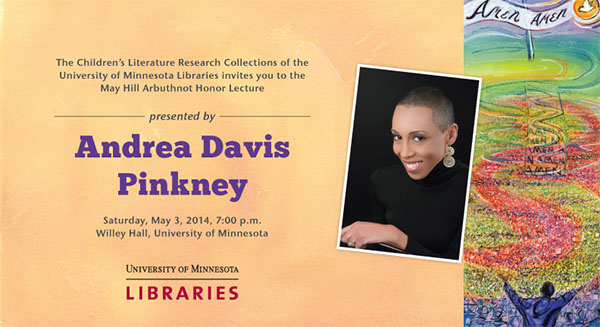 On Saturday, May 3, Andrea Davis Pinkney delivered the 2014 May Hill Arbuthnot Lecture, titled "Rejoice the Legacy," at the University of Minnesota Children's Literature Research Collections in Minneapolis. The Arbuthnot is an annual lecture delivered by a person chosen by the Association of Library Service to Children who has made "significant contributions to the field of children's literature."
On Saturday, May 3, Andrea Davis Pinkney delivered the 2014 May Hill Arbuthnot Lecture, titled "Rejoice the Legacy," at the University of Minnesota Children's Literature Research Collections in Minneapolis. The Arbuthnot is an annual lecture delivered by a person chosen by the Association of Library Service to Children who has made "significant contributions to the field of children's literature."
Andrea Davis Pinkney's presentation begins in darkness.
A lone trumpet's wail breaks the silence with
"Late One Night" from George C. Wolfe's Harlem Song.
On a large projection screen,
images in black and white appear:
the Middle Passage,
sharecroppers, soldiers, baseball players,
children in churches, children in schools,
students at lunch counters,
the Rex Theatre for Colored People,
the Apollo and the Cotton Club,
everyday people and famous people.
Ruby Bridges and the Little Rock Nine,
Malcolm X and Martin Luther King Jr.,
Lyndon Baines Johnson,
Duke Ellington, Cab Calloway,
Zora Neale Hurston and Billy Holiday.
Andrea Davis Pinkney enters Willey Hall auditorium
clapping in rhythm.
The sold-out crowd claps with her.
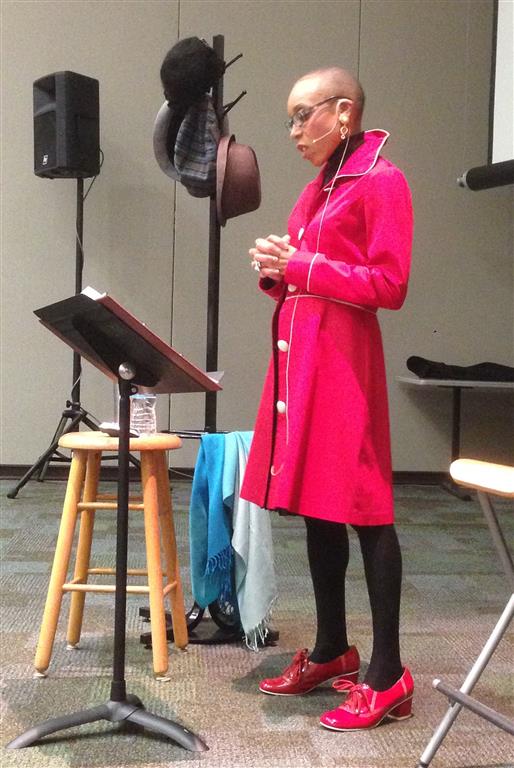 "What does one wear to deliver the May Hill Arbuthnot Lecture?"
"What does one wear to deliver the May Hill Arbuthnot Lecture?"
Andrea Davis Pinkney begins.
Her glorious garnet-colored knee-length jacket fits her like a glove
and perfectly matches her ruby-red slippers
with a bit of heel to augment her height, just shy of 5 feet.
As she describes consulting her "fashionista" teenage daughter,
the light mood allows everyone to settle into their seats
following the powerful images and soulful voices of the overture.
The woman standing before us,
award-winning author and editor of award-winning books,
confesses she'd struggled to read.
Her mother, an English teacher and
the first woman in her family to go to college,
would not give up on her daughter, Rae,
as her family and friends called her.
A picture of Rae as a smiling girl of perhaps seven
appears on the projection screen.
A librarian matched her with the right book,
Hop on Pop by Dr. Seuss.
Worlds opened up to her.
She dreamed of emulating
John Boy Walton and Mary Richards,
becoming a writer and a journalist,
moving to the city and having a career
and a best friend like Rhoda Morgenstern.
She carried notebooks with her wherever she went,
recording all the things grown-ups say.
An array of colorful spiral-bound notebooks appears on the screen.
Andrea Davis Pinkney puts on a hat,
plays the part of a male peer:
"Hey, Rae, whatcha got in that notebook?"
(Takes the hat off, as Rae) "Nothin.' "
(Hat back on) "Well let me see the nothin' in your notebook."
Her mother continued to encourage her,
"Let's start at the beginning of those who wrote and spoke."
Pinkney quotes the words of Frederick Douglass,
"The more I read, the more I was led," from his Narrative of the Life
of Frederick Douglass an American Slave, Written by Himself,
and one of the 10 men featured in her book Hand in Hand.
She added, "I was granted the freedom to read
and go anywhere I wished."
She takes us on a journey down what she calls
"the Fine Black Line," the legacy
of African American storytelling:
The rhythms of talking drums,
following the drinking gourd,
The Renaissance in Harlem.
She sings a phrase from "Wade in the Water" and "We Shall Overcome."
She connects to Langston Hughes, Paul Lawrence Dunbar, Richard Wright,
and Zora Neale Hurston--especially, "How It Feels to Be Colored Me."
"What if May Hill Arbuthnot ran into Zora Neale Hurston
at a Columbia University reunion?" Pinkney wonders.
They were students on the campus at around the same time.
Two side-by-side, black-and-white photos of the women
appear on the projection screen.
Pinkney pulls up her red coat's collar, leans into her words, "Hey, May!"
Then puts her collar down, stands primly, even stiffly, "Hello, Zora."
Pinkney moves between the two women
as they catch up on their accomplishments.
With affection, admiration and humor
Pinkney contrasts their differing styles.
In journalism school at Syracuse University,
"My habit of carrying notebooks was affirmed," Pinkney joked.
There she met John Keats (named after the poet),
who taught her, "Writers write no matter what,"
and also, "When you share your writing, it may help someone,
touch someone, or change someone."
Few have done more
to further "the Fine Black Line"
than Andrea Davis Pinkney.
First as a senior editor at Essence magazine,
then as a writer and editor of children's books,
she has shown children--and adults--
that they come from a lineage of writers, artists and citizens
capable of changing the world.
At Essence, her charge was to assemble
a round-up of books for and about African American children.
Pinkney discovered Virginia Hamilton,
Eloise Greenfield, Patricia McKissack,
Mildred Taylor and Walter Dean Myers.
She began to "nag" her then-boyfriend, artist Brian Pinkney,
who urged her to write the books.
She was hired as a children's book editor,
later invited to launch the Jump at the Sun imprint at Disney.
There she bought a first novel by Sharon Flake, The Skin I'm In,
"a modern version of 'How It Feels to Be Colored Me,' "
as Pinkney referred to it.
Still, she heard the voice of her boss at Essence:
"Remember your charge."
"How could I approach the topic of lynching for young people?"
Pinkney asked herself.
Marilyn Nelson would be the one who could do it.
The day before Thanksgiving, Pinkney invited Nelson
into her office, screwed up her courage, and made her request.
"I can't do it," Nelson replied. "It's too sad."
But the following Monday, Pinkney found in her in-box
a heroic crown of sonnets, A Wreath for Emmett Till.
Nelson still receives letters from middle school
and high school students about the book, more so
after the death of Trayvon Martin.
On the projection screen, two black-and-white photos appear:
Trayvon Martin and Emmett Till.
They lived 54 years apart. But
"What if they attended Morehouse College together,
and walked on a path to change, comfortable and casual,"
Andrea Davis Pinkney asks.
She removes her glorious garnet-colored jacket
and ruby slippers
and puts her arms through the sleeves
of a dusky blue sweatshirt.
She pulls up its hood:
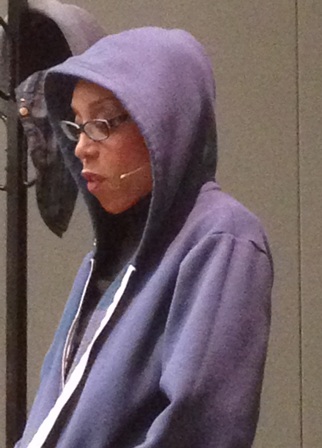 "Comfortable and casual, ready for study."
"Comfortable and casual, ready for study."
She turns her back to the audience.
We sit alone in the silence with our thoughts.
Uta Hagen in Respect for Acting wrote that
the greatest achievement with an audience
is the tears and the hush. Not the applause.
We sit in the hush.
Andrea Davis Pinkney turns to us in her dusky blue hoodie and asks:
"What does one wear to deliver the May Hill Arbuthnot lecture?"
--Jennifer M. Brown
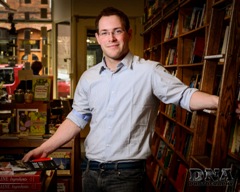 "I wouldn't work at a bookstore if I didn't think they had a place in the modern age. Yes, I think bookstores have a home as a place for events, for brick-and-mortar business, and as an avenue for both local and travelling customers.... Indies can compete by focusing on their strengths--curation, expertise, creativity, and a connection to community (be it local partnerships, donations, or events)--and fulfilling the wants and needs of their customers, rather than fretting about the behemoth companies. Things like the 'buy local movement' have also helped lift bookstores alongside other independent businesses."
"I wouldn't work at a bookstore if I didn't think they had a place in the modern age. Yes, I think bookstores have a home as a place for events, for brick-and-mortar business, and as an avenue for both local and travelling customers.... Indies can compete by focusing on their strengths--curation, expertise, creativity, and a connection to community (be it local partnerships, donations, or events)--and fulfilling the wants and needs of their customers, rather than fretting about the behemoth companies. Things like the 'buy local movement' have also helped lift bookstores alongside other independent businesses."




IPC.0204.S3.INDIEPRESSMONTHCONTEST.gif)



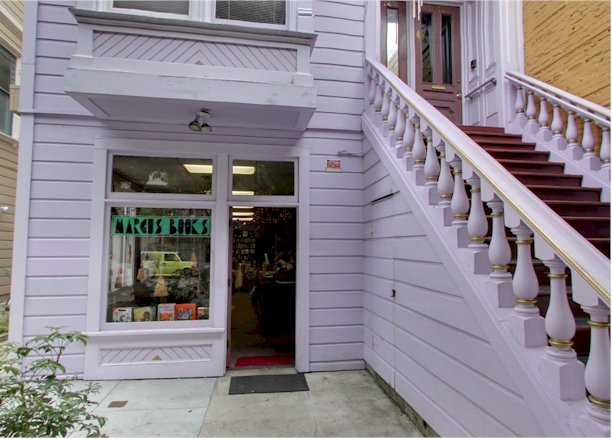

 Calling the decision a "striking about-face," the New York Times reported that the
Calling the decision a "striking about-face," the New York Times reported that the 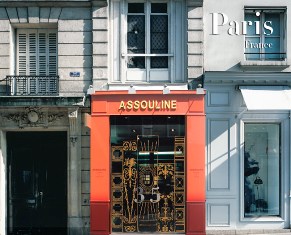 French publisher
French publisher  On May 18, the Borders bookstore in Singapore's Westgate Mall--opened five months ago by Popular Holdings--will be
On May 18, the Borders bookstore in Singapore's Westgate Mall--opened five months ago by Popular Holdings--will be 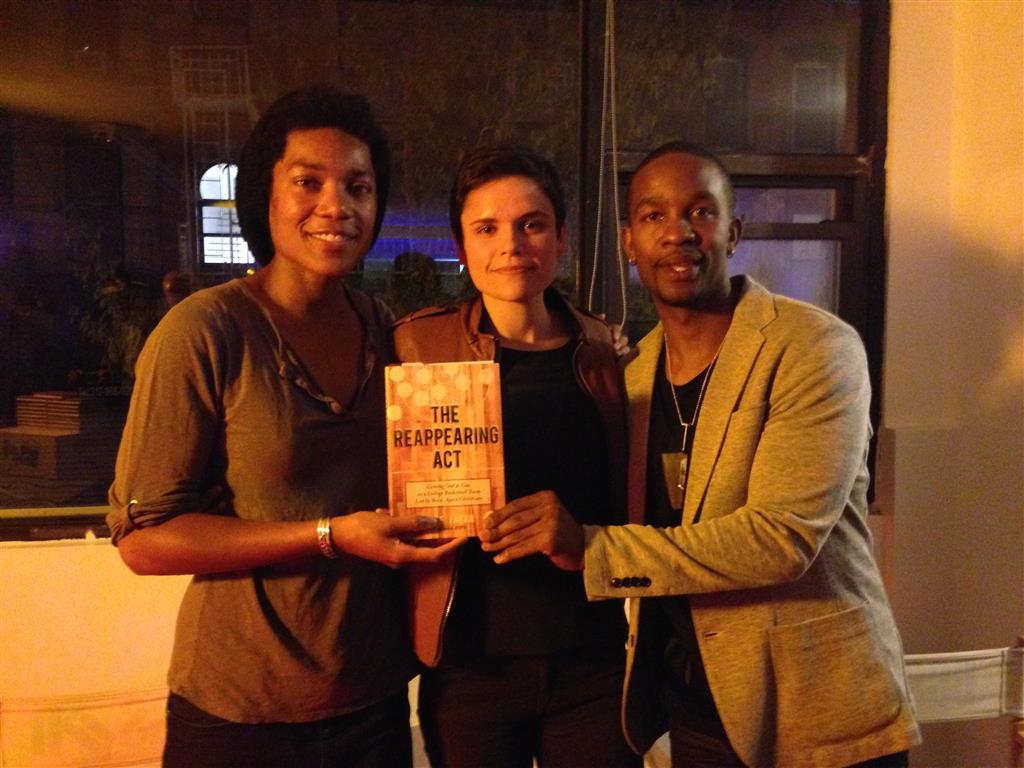 Wade Davis (r.), former NFL player and executive director of the
Wade Davis (r.), former NFL player and executive director of the 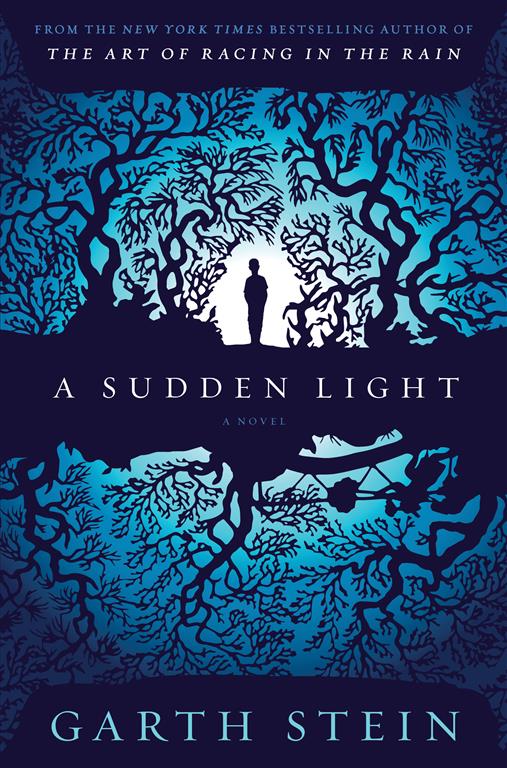 From Garth Stein, the author of The Art of Racing in the Rain, the cover for his new novel, A Sudden Light, which Simon & Schuster is publishing in September.
From Garth Stein, the author of The Art of Racing in the Rain, the cover for his new novel, A Sudden Light, which Simon & Schuster is publishing in September.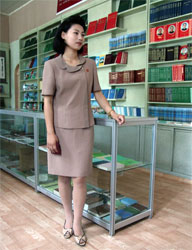 While Portuguese writer Jose Luis Peixoto "
While Portuguese writer Jose Luis Peixoto "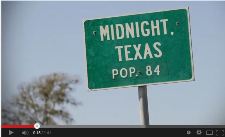 Midnight Crossroad
Midnight Crossroad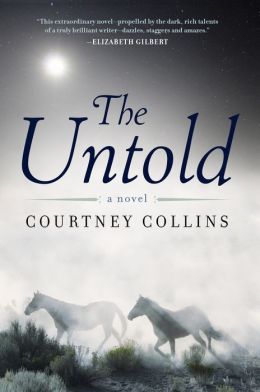 In the bush of 1920s New South Wales in Australia, readers observe a young woman digging by a river and then running for the hills. Her story unfolds slowly, in fractured time and brief views, in The Untold, a dreamy debut novel by Courtney Collins based on the life of legendary Australian wild woman Jessie Hickman.
In the bush of 1920s New South Wales in Australia, readers observe a young woman digging by a river and then running for the hills. Her story unfolds slowly, in fractured time and brief views, in The Untold, a dreamy debut novel by Courtney Collins based on the life of legendary Australian wild woman Jessie Hickman.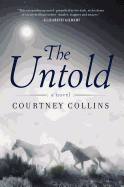
 On Saturday, May 3, Andrea Davis Pinkney delivered the 2014 May Hill Arbuthnot Lecture, titled "
On Saturday, May 3, Andrea Davis Pinkney delivered the 2014 May Hill Arbuthnot Lecture, titled " "What does one wear to deliver the May Hill Arbuthnot Lecture?"
"What does one wear to deliver the May Hill Arbuthnot Lecture?" "Comfortable and casual, ready for study."
"Comfortable and casual, ready for study."